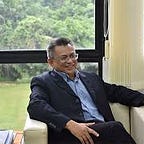Developing Future-Proof Graduates
Responding to society’s expectations and needs
In addition to developing students’ knowledge, society expects higher education institutions to be able to produce graduates who are ready for the workplace. The debate on whether higher education institutions should play the role of knowledge developer or whether they should instead be producers of industry-ready graduates has been going on for a long time. Today, with everyone’s attention being shifted to the Fourth Industrial Revolution (4IR) in times of economic uncertainty and shrinking employment opportunities, the expectation placed on higher education institutions to be industry-relevant has significantly increased.
Responding to the issue above, the Ministry of Education Malaysia has developed a framework on how to produce future proof talents for the 4IR. It aims to assist higher education institutions in providing conducive learning environments that inculcate innovation and creativity in students. The framework identifies nine skill-sets that need to be learned and practiced by Malaysians, as below:
The question is — to what extent are the academics in Malaysian higher education institutions developing these skill-sets among their students?
Many studies on graduate employability including those recently published have revealed employers’ dissatisfaction regarding graduates’ skills. Such findings are certainly disconcerting not just in the eyes of industry players but also higher education providers.
Towards heutagogy, peeragogy and cybergogy!
Change is imperative. Educators can no longer remain in the ‘business-as-usual’ mindset. They need to change the way they deliver knowledge so as to be aligned with the needs of the future — some called it a new cultural renaissance introduced by the 4IR. Traditional pedagogy in which the teacher is the master of knowledge is no longer acceptable. The buzzwords in teaching now are ‘heutagogy’, ‘peeragogy’ and ‘cybergogy’.
Students, as the framework puts it, should not just be knowledgeable but must also possess multiple intelligence, computational thinking and embrace life-long learning. But to what extent is the present highly segmented and specialised curriculum able to develop these attributes?
The graduates today must also be trained to be agile and adaptive. More often than not their academic programme choice does not always translate into a straightforward career path. For instance, if you graduated from a linguistics programme, you won’t necessarily end up working in language-related jobs.
Recently, I had the opportunity to meet three former English Language and Literature Studies (ELLS) undergraduates from a local university. Interestingly, each of them has a different career path and each of them has changed jobs a few times. For instance, one of the graduates began her career as an admin executive, then moved to another company to work as a global support executive and recently hopped to an American company to serve as a trainee.
What this shows is that the career path of today’s graduates may be extremely fluid and flexible. Job hopping is common and the jobs may not be directly related to the academic programme that they followed previously.
A more fluid and industry facilitated curriculum is needed
Higher education institutions must take note of the new employment trends and adapt accordingly in their effort to produce future talents. Their curriculum needs to be adjusted in line with the employment needs of the students. A more fluid, flexible and multidisciplinary curriculum which trains students to be adaptive and ready in multiple working environments may be needed. Higher education should not just be about producing knowledgeable graduates. There should be equal emphasis on knowledge development, values and ethics, and skill enhancement. In addition, higher education institutions must work closely with the industry for better learning outcomes. The whole eco-system must work together.
